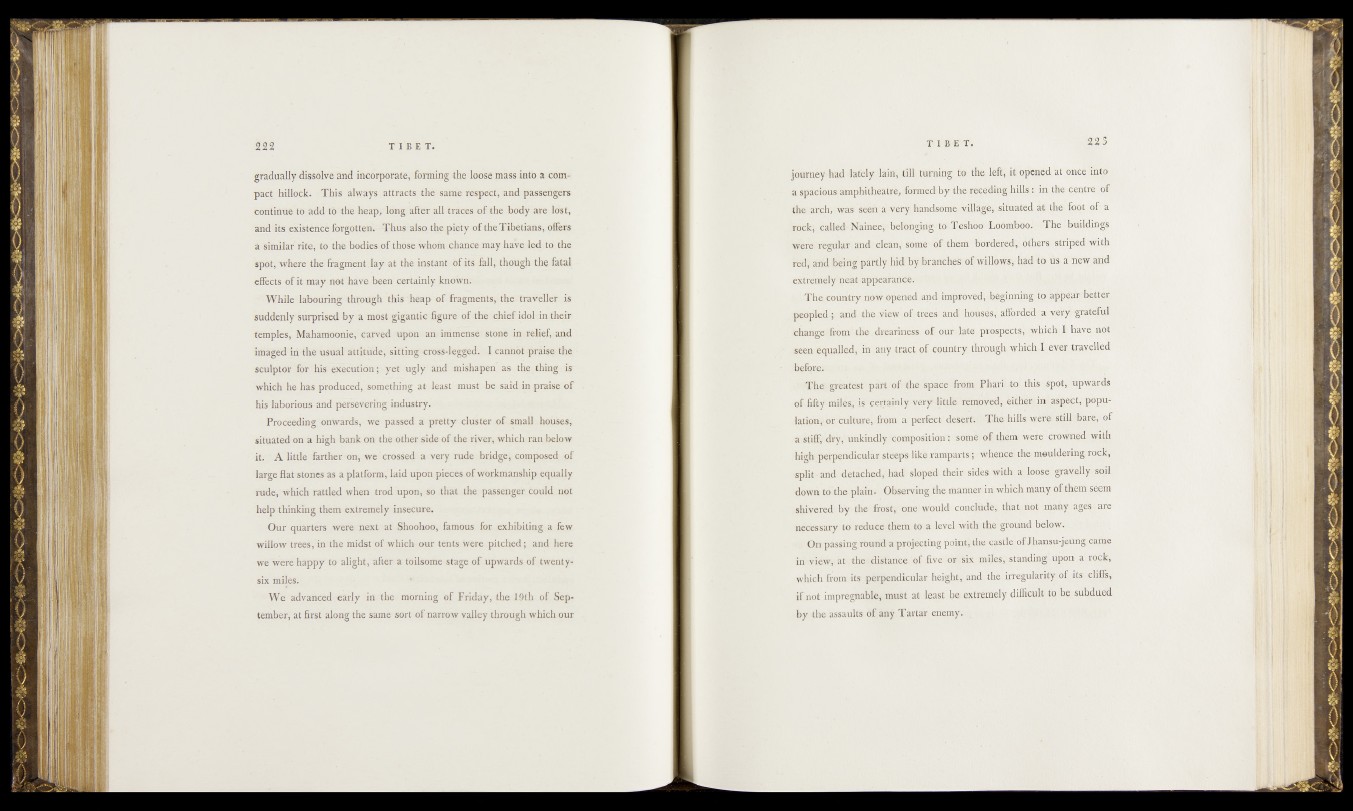
gradually dissolve and incorporate, forming the loose mass into a compact
hillock. This always attracts the' same respect, and passengers
continue to add tô the heap, long after all traces of the body are lost,
and its existence forgotten. -Thus also, the piety of theTibetians, olfers
a similar rite, to the bodies of those whom chance may have led to the
spot, where the fragment,lay at the instant of its fall, though the fatal
effects of it may not have been certainly known.; ; -
While labouring through this heap of fragments, the traveller is
suddenly surprised by a most gigantic figure of the chief idol in their
temples, Mahamoonie, carved upon an immense) stone in relief^aad
imaged in the usual attitude, sitting cross-legged, .T cannotpraise the
sculptor for his execution ; yet ugly and mishapen as the thing -is
which he has produced, something at least must be said in praiselof:
his laborious and persevering industry.
Proceeding, onwards, we passed a pretty cluster of small houses,
situated on a high bank on the other side of the river, which ran below
it. A little farther on, we crossed a very rude bridge, composed of
large flat stones as a platform, laid upon pieces.of workmanship equally
rude, which rattled when trod upon, so that the passenger could not
help thinking them extremely insecure.
Our quarters were next at Shoohoo, famous for exhibiting a few
willow trees, in the midst of which our tents were pitched; and here
we were happy to alight, after a toilsome stage of upwards of twenty-!
six miles..
We advanced early in the morning of Friday, the 19th of September,
at first along the same sort of narrow valley through which our
journey had iaSely -laihi; till- framing, tb' the left*, ift opened at oncje afttg
a spacious^bup'Sritheatre,'jo^fuedtby.' the ieroding InLly^iji^tl^O centii- of
tho/arch. -was seen*’ a very handsome, v|lj’4gd^i situated a# 'dfr a
rock, called*' Maihee^'belqnging-r^f|'!E^hhd?'Lobm:bioo.b*'iThed buildings
Were regular and'clean^^ne' of them'; bqi?dfsedJ,‘< others. - Striped with
red,’ arid being;partly,hid by#xan®hess,of'WilloW^vhad>*f;0 u’S;a ri&w, and’
extrdmsiy^ neat -appearanee$^%
t‘, ^efibouiitpy npw opened^^M-iptpro\ oil hoguininglto^appdU'hotter,
peopled.; and the .view cffi trbes,.aii(l}dio^s^,all(i,f(lJl' a.>\1er')|fgratbli‘fil
change from the dreariness of* our.latd,xpS5Sppcts^)^hiph|I have not
•seen equalled, in any .tract of country through, yjafchTever travelled
before, >
• ? '•®h&.greatest part of thewpao'e' from-i Phari? .toj this ^spfpjMpwards
of-fifty'miles,' is certainly vSrjfelittle removed,«either; in ^Spect,^^!'-,
lation#hf culture, from a .perfect desert. The, hills- w,er#s$&bare,< of
a stiff, dry, unkindly 'composition-: (-'st^e^O^thenB were-croWnpd. with
high perpendicular steeps like ramparts1; ^Mfentee! che< mouldering;in^lc,
-split and detached, had sloped their- s-idfis with a^lposeijgrayfelly sojl
down to the plain- Observingtihe manner jn;-whicb many oftthen^rS^pi
shivered by the frost, one would concede!, that--UQt-unahy .agehaafie
necessary to reduce them to -a level witly thd ground below.1 - * i
... Onpassing rbundsaprqjefcting pa^m^-theG^le o'fiftansu^eungtsajke,
iri view, at 1 he distance of five or six miles, standiri^u^dpfta. rock;
which from its perpendicular heigh#.and, the irregu 1 a,|i'ty o 1,Itc}jfjs*,
if not impregnable*, must at-least be extremely dilficplt-fo besubjduod
by the assaults .of arty Tartar enemy.. .